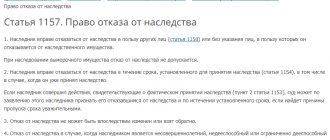By law (without a will)
An inheritance can be accepted from the date of opening of the inheritance within 6 months (Article 1154 of the Civil Code of the Russian Federation)
To enter into an inheritance, you must submit a corresponding application to a notary. A similar procedure is established for refusal of inheritance. You cannot apply later.
The day of opening of the inheritance depends on the method of establishing the fact of death:
- Ascertainment by doctors . At the morgue, relatives are issued a medical certificate (form No. 106/u-08, approved by Order of the Ministry of Health and Social Development of the Russian Federation No. 782n dated December 26, 2008).
- Judicial establishment. If a citizen is declared dead through a court, then the date of death is not considered the day the court decision was announced, but the day it entered into legal force (Article 45 of the Civil Code of the Russian Federation).
Later, the heirs apply to the registry office at the place of registration of the deceased citizen and receive a death certificate (approved by Order of the Ministry of Justice of Russia No. 167 of August 13, 2018). The date and time of death are indicated in a document from the morgue or a court decision. Similar information is displayed in the certificate issued by the civil registry office.
Deadline for accepting inheritance by law
The Civil Code provides for the possibility of accepting inheritance in various ways:
- by applying for acceptance of the inheritance to a person authorized to issue a certificate of the right to inheritance (a notary or an official of a consular office in the Russian Federation)
- by “actual acceptance” of the inheritance (Article 1153 of the Civil Code).
For your information
Regardless of the chosen method of accepting the inheritance, the period allocated by the legislator for the implementation of this procedure is 6 months (Article 1154 of the Civil Code). This period is calculated from the date of opening of the inheritance, that is, from the date of death of the testator.
an exception to the general rule . Thus, if a court makes a decision regarding a citizen establishing the estimated date of his death (plane crash, ship accident, military action, etc.), the period for entering into inheritance begins to count not from the date of death established in the court decision, but from the moment the entry into force of such a decision (clause 1 of Article 1154 of the Civil Code).
If a person has the right to inherit as a result of the refusal of other heirs from this right, the inheritance can be accepted within 6 months from the date the right of inheritance arises (clause 2 of Article 1154 of the Civil Code).
The right of heirs to refuse to accept an inheritance (except for escheat) is enshrined in Art. 1157 Civil Code.
If the heir of the previous line did not accept the inheritance for any reason, the heir from the next line can accept it within 3 months from the date of expiration of the six-month period allocated for the acceptance of the inheritance by the previous heir (clause 3 of Article 1154 of the Civil Code).
By will
The legislation does not make any differences in the inheritance procedure. Heirs must also submit an application within 6 months.
The only advantage of a will is that if there is a will, the legal successors can be removed as heirs. The testator can assign property to an uncle, nephew, sibling, or childhood friend.
The beneficiary does not need to prove relationship with the deceased citizen. It is enough to provide the notary with the original will.
The only restriction is that the owner cannot deprive the property of obligatory bidders. If a deceased citizen has a young child or a disabled parent, then he is entitled to a share of the inheritance.
Is it possible to enter into an inheritance before 6 months?
Within the 6 months allotted by law, the notary who opened the inheritance case expects applications from the heirs to accept the inheritance or to issue a certificate of the right to inheritance (Clause 1, Article 1153 of the Civil Code of the Russian Federation). A person authorized to carry out notarial acts can notify about the opened inheritance only the heirs whose place of residence is known to him.
A death certificate is issued 6 months to all heirs simultaneously. At their request, one document can be issued to everyone or to each individual (Article 1162 of the Civil Code of the Russian Federation).
The law provides for the possibility of entering into rights before the end of the established period.
Special situations:
- The assignee can prove that he is the only heir . When inheriting by law, it is quite difficult to officially confirm this fact. For example, a man might not know that he has a natural child. And after the death of the owner, the child’s mother can submit an application to establish the fact of inheritance. However, the method may well be used in relation to a deceased woman.
- The recipient actually accepted the property . A citizen can take actions to store, repair, and maintain the property of the deceased. In addition, he can use it for its intended purpose. Thus, the recipient is vested with interest in the property even before the expiration of 6 months.
Inheritance by law
The transfer of inheritance (inheritance) by law provides for the transfer of property to the heirs according to priority (clause 2 of Article 1111 of the Civil Code of the Russian Federation, hereinafter referred to as the Civil Code of the Russian Federation). This procedure is applicable only in the case where there was no will of the testator or it was successfully appealed in part or in full by one of the heirs, or the heirs under the will refused to inherit, or the heir under the will died before accepting the inheritance or was declared unworthy.
The Civil Code of the Russian Federation establishes a division into eight lines of inheritance (seven lines and inheritance by right of representation). The first stage includes children, spouse (husband or wife) and parents of the testator (Part 1 of Article 1142 of the Civil Code), the second - brothers and sisters, as well as grandparents on any of the lines (Part 1 of Article 1143 of the Civil Code) , to the third - brothers and sisters of the testator's parents (uncles and aunts) (clause 1 of Article 1144 of the Civil Code).
Subsequent queues are determined by the degree of relationship, that is, the number of births separating relatives from each other. For example, the fourth degree of the third degree of kinship is great-grandfathers and great-grandmothers, the fifth degree of the fourth stage is the children of one’s own nephews and nieces, etc. (Article 1145 of the Civil Code)
What actions need to be completed within the allotted time?
During the specified period, legal successors must perform the following actions:
- Submit an application to a notary office.
- Prepare title documents.
- Collect or restore documents on the presence of family ties.
- Establish paternity posthumously in court.
- Conduct a property assessment.
- Pay the state fee.
- Contact the notary again.
List of documentation for applying to a notary office
| № | What is the document for? | What can you show? |
| 1 | To certify the fact of the death of the testator | Death certificate issued by the registry office, or a corresponding court decision |
| 2 | To verify the identity of the applicant |
|
| 3 | To confirm the last place of residence of a deceased person | Certificate of residence (issued on the basis of the house register and death certificate) |
| 4 | To confirm the close relationship of the applicant with the deceased person |
|
Maximum period for entering into inheritance
The maximum period for entering into an inheritance directly depends on the status of the successor:
- Heirs of the 1st stage apply to the notary office within 6 months.
- If they are absent, then during this period other relatives who have the right to the property (in accordance with the order of inheritance) must apply.
- If the legal successors of the 1st line executed a written refusal of the property or were removed by a court decision, then the recipients of the 2nd line are given another 6 months. The period begins to run from the day following the registration of the refusal, or the day following the day the court decision enters into legal force.
- If recipients of the 1st line simply did not appear before the notary, then the assignees of the 2nd line have the right to apply within 3 months.
- In the event of the death of an heir after the opening of an inheritance case, his successors have the opportunity to submit an application to a notary within the prescribed period. If the citizen died after 3 months, the period is extended for another 3 months.
- If there is a conceived but unborn baby, the time frame for registering an inheritance increases until the child is born. The notary is obliged to suspend the issuance of the certificate if he becomes aware of such a fact.
If during this period the heirs do not contact the notary, then the property rights are transferred to other persons. If it turns out that the deadline for submitting documents has expired, the notary will refuse to issue a certificate.
The ultimate beneficiary is the state. It accepts property that is declared escheat.
Expert opinion
Stanislav Evseev
Lawyer. Experience 12 years. Specialization: civil, family, inheritance law.
Reinstatement of deadlines is allowed through the court if the applicant missed them for a good reason. By acting independently and without legal support, you can make mistakes, the correction of which will take time. This will lead to missing the deadline and all the associated problems.
A case can be initiated in court within 6 months after the reasons for absence have ceased. If you missed the deadline for accepting an inheritance, contact our lawyers, they will help you restore them in court.
Example. Citizen M. was on a business trip outside the country. At this time his father died. The son hired a funeral agency to organize the funeral, but he himself could not return to the country. He arrived only 1 year later. During this time, the deadlines for entering into inheritance expired. My father left behind a bank account. The assignee turned to the notary and was refused. After which, he filed an application with the court to restore the terms. The court satisfied the plaintiff's demands.
Opening of inheritance: date, time, deadlines
Entry into inheritance (Article 1113 of the Civil Code of the Russian Federation) becomes possible from the moment of death of the giver. The same legal relations arise when the court recognizes the testator as dead. Only living successors, as well as children conceived during the life of the giver (who were born later than the opening of the inheritance), can receive the property of a loved one.
According to Article 1115 of the Civil Code of the Russian Federation, entry into an inheritance can be carried out in a notary office at the place of residence of the testator or by performing actions indicating actual acceptance. Persons who:
- Committed a crime against the deceased or successors.
- Failure to fulfill legal obligations towards the testator.
- They were excluded from the number of applicants by the will.
- They were deprived of parental rights (in case of inheritance after the death of children).
Article 1154 of the Civil Code of the Russian Federation establishes the period during which acceptance of an inheritance is allowed. According to the standard, entry can be made within 6 months from the date of opening the inheritance case. Successors who received the right to join when changing legal priority can count on an increase in the registration period by another three months.
What happens after 6 months?
If relatives of the 1st line refused the inheritance or were removed on the basis of clause 1 of Art. 1117 of the Civil Code of the Russian Federation, then the heirs of the next priority are called upon to inherit.
Grandparent, brother or sister of the testator. Beneficiaries of the 2nd line are also given 6 months to submit papers. In this case, we mean heirs by law of the same order.
If the heirs of one line did not accept the property of the testator, then the heirs of the next level are given 3 months from the day following the end of the 6-month period that was allotted to the heirs of the previous line.
Important! You should know that there is a difference between refusing an inheritance and not accepting an inheritance. It lies in the fact that in the first case, the heir expresses his opinion in the prescribed manner, and in the second, he does not take any action.
Example. After the death of citizen K., a house in the village remained. The heirs of the 1st line did not declare their rights. The right of inheritance passed to relatives of the 2nd degree. Four months later, the testator’s brother died. The right of inheritance passed to his son (nephew of the testator) on the basis of hereditary transmission (Article 1156 of the Civil Code of the Russian Federation). The inheritance period is general (6 months), but it is counted from the date of death of citizen K. Therefore, the descendant has 2 months left to file an application. But according to the law, if the remaining period is less than 3 months, then it is extended to 3 months.
Acceptance of an inheritance can also occur after the fact. For example, the heir lived with the testator for 1 year. After the death of his father/mother, the son continued to use the property. You have all the necessary papers on hand. There are no other claimants to the property of the head of the family. The heir can claim his rights even after 10 years . The notary is obliged to issue him a certificate.
Consequences of missing deadlines
Receiving the property of the deceased by law implies the transfer of rights to the property until at least one of the legal successors registers the property. The last in line is the state. That is, the property will be received in any case.
First, the relatives of the deceased citizen are called upon to inherit. Acceptance of property occurs within the framework of the queue. Restoration of deadlines occurs through the court. The applicant will have to file a corresponding claim. The main problem is whether the reason for absence is valid
If the maximum period has passed, and the successors of all orders have not contacted the notary, the deadline for entering into inheritance has been missed.
This leads to the fact that the property left behind by the testator acquires the status of escheat, that is, one that no one owns. It becomes the property of the state. In this case, in order to enter into inheritance rights, the missed period will have to be restored.
If the inheritance is actually accepted, the consequences are different. The relatives of the deceased citizen will not be able to dispose of his property until they complete the paperwork.
They will need to contact a notary or court and submit documents confirming their rights to inheritance. You can re-register ownership of yourself by a court decision or on the basis of a certificate confirming the citizen’s right to inherited property.
The inheritance must be accepted within...
The law specifies the period during which the heir can assume his rights. It is six months, starting from the date of opening of the inheritance. Thus, within the next six months after the death of the testator, the heir needs to come to the notary and declare his status as a contender for the inheritance.
As a rule, the date of opening of the inheritance coincides with the date indicated on the death certificate of the testator. However, sometimes situations arise in which the fact of a person’s death can only be established in court. Accordingly, in this state of affairs, the countdown of six months begins from the day the person is declared dead by the court.
If the heir has not entered into the inheritance within 6 months...
Read about inheritance rights here.
What is the period for entering into inheritance after death, read the link:
Sometimes situations arise in which some heirs lose their right of inheritance, and their places are taken by new persons. The period for accepting an inheritance depends on the reasons for deprivation of the right to inherit.
Thus, if the heir refused to enter into inheritance rights voluntarily or was declared unworthy, then those who received the right to inheritance must officially accept it no later than six months from the moment of refusal or recognition of the previous applicant as unworthy.
The moment that is the starting point of the deadline can be:
- Date of filing the application for refusal of inheritance;
- Date of entry of a court decision declaring an heir unworthy or recognizing the fact of a person’s refusal to inherit.
There is one more circumstance in which a person can obtain the right of inheritance. We are talking about a situation in which, within a six-month period, absolutely none of the other heirs declared their claims. In this case, the person has the opportunity to accept the inheritance within three months after the expiration of the main six-month period.
Practice shows that many heirs confuse the statutory requirement. They decide to contact a notary not during the six-month period, but after it ends.
There are also heirs who believe that the very fact that they are sole heirs frees them from the need to visit a notary and carry out the necessary procedures.
We would like to draw your attention to the fact that all these mistakes are fraught with missing the deadline and subsequent problematic restoration of rights to inheritance.
What to do if the deadline is missed?
Please note that the period for inheritance can only be extended upon receipt of property through hereditary transmission! In other cases, the missed deadline (only if there are good reasons) can be restored.
So, if it turned out quite by chance that you became an heir, but then it turned out that the deadline established by law for accepting it has expired, then there is no need to panic. The law is on the side of the “late” heirs and provides them with the opportunity to restore rights to the property of a deceased relative. This is provided for in Art. 1155 of the Civil Code of the Russian Federation.
There are 2 ways to enter into an inheritance after the expiration of the allotted period:
- By agreement . Applicable in situations where there are other legal successors who have assumed their rights of inheritance. In this case, the following condition must be met: all specified persons must express their consent that another heir will participate in accepting the property of the deceased relative.
- Through the court . If the beneficiary simply did not know that he should contact a notary, then his claim will definitely be denied. But if he was in the hospital or abroad for several months and did not know about the death of the testator, then the court will restore the period. However, the plaintiff must provide written evidence of the stated facts.
In practice, the method by agreement is used quite rarely, since not everyone agrees to share property with the “latecomer”, so the only option for him remains restoration of his rights through the court
Satisfaction of requirements does not always occur. The reason is the absence or insufficiency of evidence that there are compelling reasons for the omission.
In this case, the whole difficulty lies in the fact that the law (Article 205 of the Civil Code of the Russian Federation) does not provide an exhaustive list of such grounds. Cases in courts are considered individually and on the basis of judicial practice in inheritance cases, which is regulated by Resolution of the Plenum of the Supreme Court No. 9 of May 29, 2012.
Therefore, it is advisable to submit the following documents:
- about completing a course of treatment;
- about being on a long business trip;
- evidence of actual acceptance of the inheritance.
Often, the court considers force majeure circumstances (natural and natural disasters, war, etc.) to be valid reasons. Our lawyers will help you draw up a statement of claim to restore the deadlines.
At the same time, it is important to comply with one more condition: the “late” heir must file a claim in court no later than 6 months after the reasons for which he was unable to timely exercise his right to inheritance have disappeared.
Example. The plaintiff is a woman who was in prison for several years. During this time, her parents died. The apartment acted as the hereditary estate. The plaintiff’s brother inherited his ½ share in it, and the sister managed to restore her rights to the second half only through the court 10 years .








